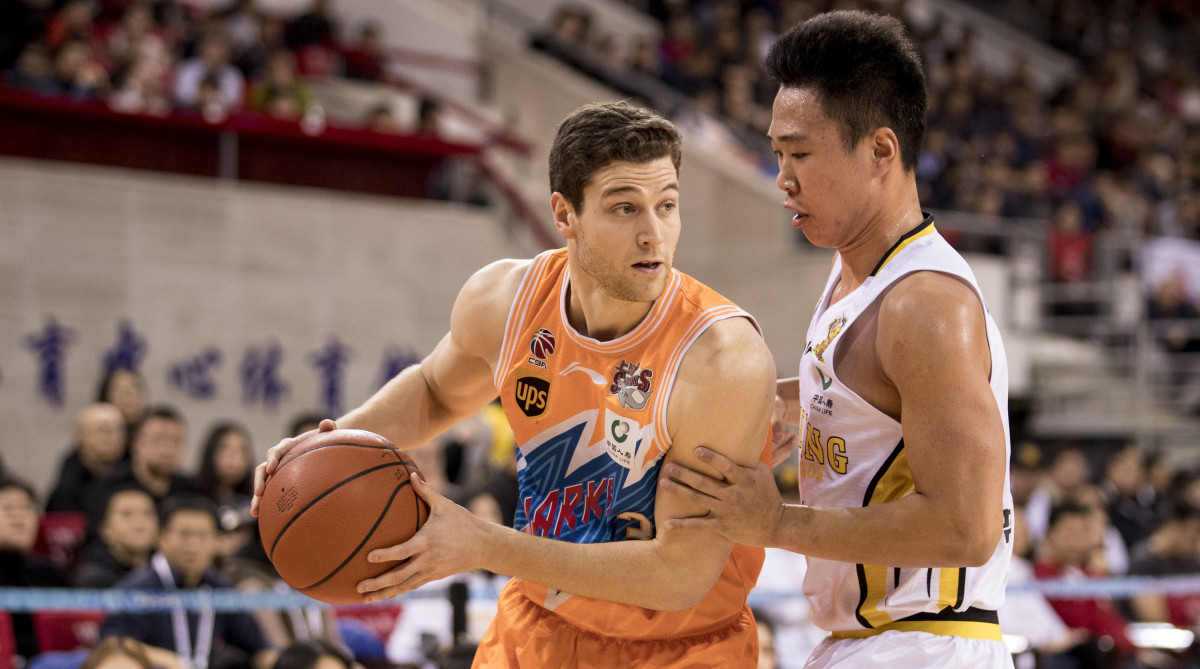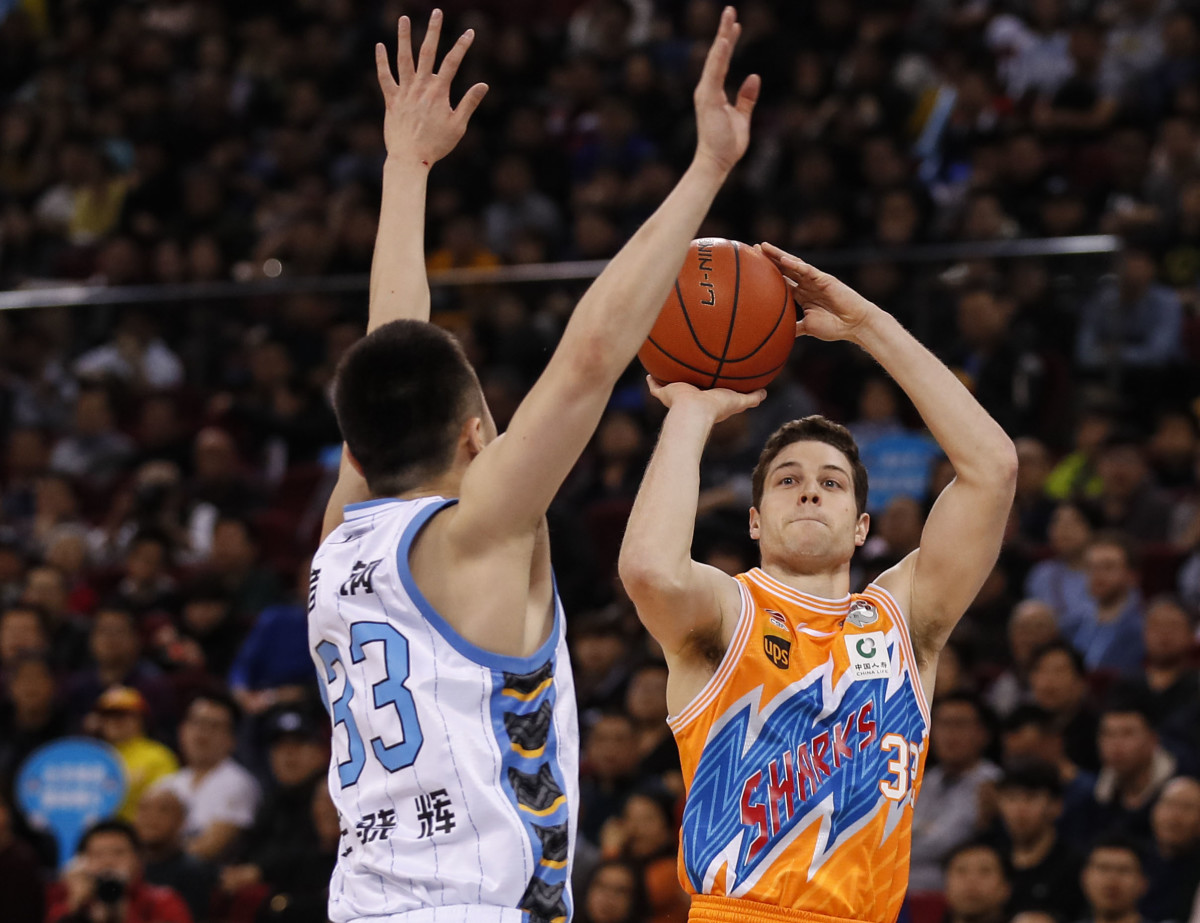Jimmer Fredette Q&A: The Three-Point Revolution, Sacramento and Chinese Hoops

You’d be forgiven for having flashbacks to 2011 while watching Jimmer Fredette light up The Basketball Tournament on ESPN and harkening back to when he took college basketball by storm and won the Naismith Award.
The No. 10 overall pick in the 2011 NBA Draft, Fredette tallied just four NBA seasons, failing to torch defenses as he once did for the BYU Cougars. But Fredette has found his groove of late, averaging 36.8 points per game for the Shanghai Sharks of the Chinese Basketball Association in 2017–18, and pouring in 32 in Team Fredette’s round one victory of TBT on July 21. Fredette will next take the court in Atlanta on Friday night.
We caught up with Fredette to discuss his career in China, the NBA’s pace-and-space boon, and memories of his time at BYU.

Michael Shapiro: Why did you decide to participate in The Basketball Tournament?
Jimmer Fredette: The biggest thing for me was to be able to play some competitive basketball in the summer. I don’t get a whole lot of opportunities to do that, specifically in China, where it’s such a short season and you get about six months off. And obviously the prize money is a perk as well and getting to play on ESPN is always fun for a player as well.
MS: Is playing in this tournament a showcase of your skills for NBA teams?
JF: It’s just always nice to play in front of American audiences again. You never know who is watching, but at this point I’m just trying to get better as a player and have fun doing it. I have one year left in China for my contract, but after that I’ll be a free agent and we’ll see what’s out there.
MS: After spending two seasons playing with the Sharks in the CBA, how does your game stack up compared to your last stint in the NBA?
JF: I’m definitely a better player than I was before coming over, that’s for sure. I’ve really grown as a player, becoming versatile, able to do multiple things offensively. I’ve gotten stronger and learned how to cut guys off, stay in front. I think I’ve matured mentally and physically as a basketball player and I’m better than I ever have been.
Thunder’s Paul George Harbors No Lakers Regrets: ‘I Don’t Need No Big City or Big Lights’
MS: What have you learned about yourself and your game while playing in China?
JF: I’ve been able to go out and play where I’m a leader of the team, and looked at to do a lot of different things. Some nights I have to be a facilitator and get other guys involved, some nights I have to rebound the basketball well, and a lot of nights they need me to score. People see the scoring and oftentimes that’s all they think about with me, but I try to get better at all aspects my the game and become a better basketball player.
MS: Was there any awareness of you from Chinese fans heading into the CBA, and what kind of reception have you received while playing for the Sharks?
JF: People didn’t know much about me when I got there. The avid sports fan there knew a bit about college basketball, about me at BYU, but it’s mainly the NBA over there. When I got over there I had to show who I was and I think pretty quickly people learned about the kind of player I am. The fans are great, they’ve been super receptive to me and my family and I really appreciate that.

MS: Why have you been so effective in the CBA?
JF: A lot of NBA guys translate well when going to China because they’re expected to score the basketball, while sometimes in Europe you’ve got to fit into a system and not get as many opportunities to be ball dominant. This style translates pretty well to an NBA player and scorer, but I’ve played on the ball, off the ball here, and I’ll be ready to transition successfully wherever I go.
MS: With nearly the entire NBA embracing pace-and-space approach and the three-point shot in 2018, how do you think you’d fit into today’s league?
JF: Things have changed a lot from when I entered the league with three-point shooting now at a real premium as well as guys who can really hit the deep threes and give their superstars space to operate. There’s a lot of transition, a lot of moving the ball, things I excel in, so I think the league has really changed to my favor since I got into the NBA.
Summer Sneaker Wars: Biggest Winners and Losers of the NBA Offseason
MS: Entering the NBA and going to a dysfunctional organization like Sacramento, do you think your career would have gone differently if you were placed in a better situation?
JF: It’s hard to speculate, but it was tough when coach Paul Westphal drafted me and wanted me there and then got fired two weeks into my rookie year. When that happened situations change and that’s the way the business works. Who knows what would have happened had I gone somewhere else, but I did the best I could and I have no regrets from it.
MS: You became a national sensation in your senior year at BYU, what was that time like in your life being on such a magnified stage?
JF: It was definitely a whirlwind, my life changed overnight. I went from being a regular college kid to not being able to go anywhere without taking pictures and signing autographs. A lot of it happened after that San Diego State game when we beat them and we were both top 10 in the country and celebrities and NBA players started tweeting about it. It was a wonderful thing to be a part of and I’ll always be grateful for not just that season but all four years I spent at BYU.
